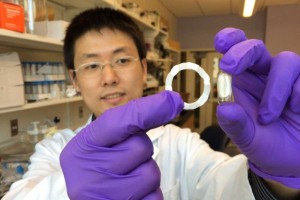
This new extended-release device has less risk of breaking or causing intestinal blockage than previous prototypes.
Image: MIT
Researchers and engineers in all corners of science have been looking at the ways their specific technical interest area can affect medicine and health care. Whether it be implantable microchip-based devices that could outpace injections and conventional pills or jet-propelled micromotors that can swim through the body to take tissue samples and make small surgical repairs, researchers have been seeing the interdisciplinary nature of science and how it could impact quality of life.
A team of researchers from MIT’s Koch Institute for Integrative Cancer Research have teamed up with Massachusetts General Hospital to develop the latest scientific advancement in health care in the form of a polymer gel that will allow for ultra-long drug delivery.
The prototype that the team has built is essentially a ring-shaped device that can be folded into a capsule. Once the patient has ingested the capsule, the device can expand back to its original form and deliver drugs over a number of days, weeks, or potentially months.
Previously, researchers have tried to develop devices similar to this but were attempting to utilize non-degradable plastic polymers. With these, there was a high risk for potential intestinal obstruction. The team from MIT found their away around this potential safety issue by developing a device that is a pH-responsive polymer gel.
This from MIT:
It is stable in the acidic stomach environment but dissolves in the small intestine’s near-neutral pH, allowing for safe passage through the remainder of the gastrointestinal (GI) tract. The material is also elastic, allowing for the compression and folding of devices into easily ingestible capsules — meaning this polymer can be used to create safe devices designed for extremely prolonged residence in the stomach.
“One of the issues with any device in the GI tract is that there’s the potential for an obstruction, which is a medical emergency potentially requiring surgical intervention,” says Giovanni Traverso, Koch Institute research affiliate. “A material like this represents a real advance because it is both safe and stable in the stomach environment.”
PS: Want to find out more about the crossover between medicine and engineer? Check out our podcast with Alvin J. Salkind, a world-leader in biomedical and battery applications.

